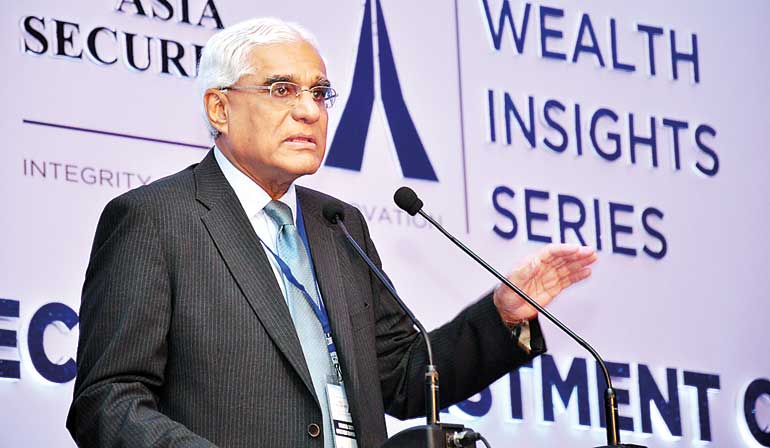Thursday Feb 19, 2026
Thursday Feb 19, 2026
Friday, 15 December 2017 09:36 - - {{hitsCtrl.values.hits}}

By Charumini de Silva
Sri Lanka’s banking watchdog the Central Bank said it was committed to achieve a balance between regulation, innovation and digitalisation, whilst taking regulatory measures to minimise technological risks.
With a view to having a transparent policy and further strengthening the risk management aspects of foreign borrowings by banks, Central Bank Governor Dr. Indrajit Coomaraswamy said a new policy, which was prepared in consultation with the banks, would be issued to banks shortly.
“In relation to emerging risks such as cyber security threats, the Central Bank, together with the banking sector, continues to explore measures that can be taken to address these,” he said while speaking at the Financial Sector Investment Conference organised by Asia Securities recently.
To broad-base share ownership in banks and to reduce the dominance and influence of a few shareholders, Dr. Coomaraswamy stressed that the existing requirements would be reviewed and a policy on encouraging shareholders of international repute and those who can contribute effectively would be adopted.
“Macroprudential surveillance is being strengthened to address any undue formation of asset or price bubbles,” he added.
In addition he assured that systemic risks were also being taken seriously and the interconnectedness of the banking sector would be monitored.
With several new players entering the banking sector, the Governor highlighted that the banking space was set to witness unprecedented changes in the time to come.
“New non-bank players in the form of fintech companies are competing to grab a larger share of the banking service value chain. There seems to be a case for banks to open another alternative delivery channel through embracing fintech to improve efficiencies, lower transaction cost and promote financial inclusion,” he pointed out.
He acknowledged that banks needed to create differentiation through e-KYC, digital-only banks, biometric-enabled ATMs, smart banking through the usage of artificial intelligence for better customer response, block chain, green financing, cloud computing, etc.
“All this is likely to gain an increasing salience in the competitive market in the future,” he said.
Dr. Coomaraswamy emphasised that current trends were such that critical mass was going to be necessary to succeed in an increasingly confident environment.
“Small and medium-sized banks need to consider merging in order to have stronger balance sheets to enable mobilising funds from the international market, to have diversified funding sources to reduce risks, to foster innovation and product pricing and enhance corporate governance. The Central Bank will encourage consolidation going forward. Capital requirements will be steadily increased to achieve this objective,” he added.
Furthermore, he noted that the banking sector was expected to reshape its business models to support the needs of the economy by growing its balance sheets focusing on long-term sustainable financing to improve bank ratings and sovereign ratings, reshaping lending strategies and corporate and business plans, focusing on benefitting from the establishment of an international financial centre, improving operational and infrastructure standards in line with international best practices, better understanding the financial needs of customers and developing a customer-centric business model, placing greater focus on SME lending and creating a greater regional or even global presence.